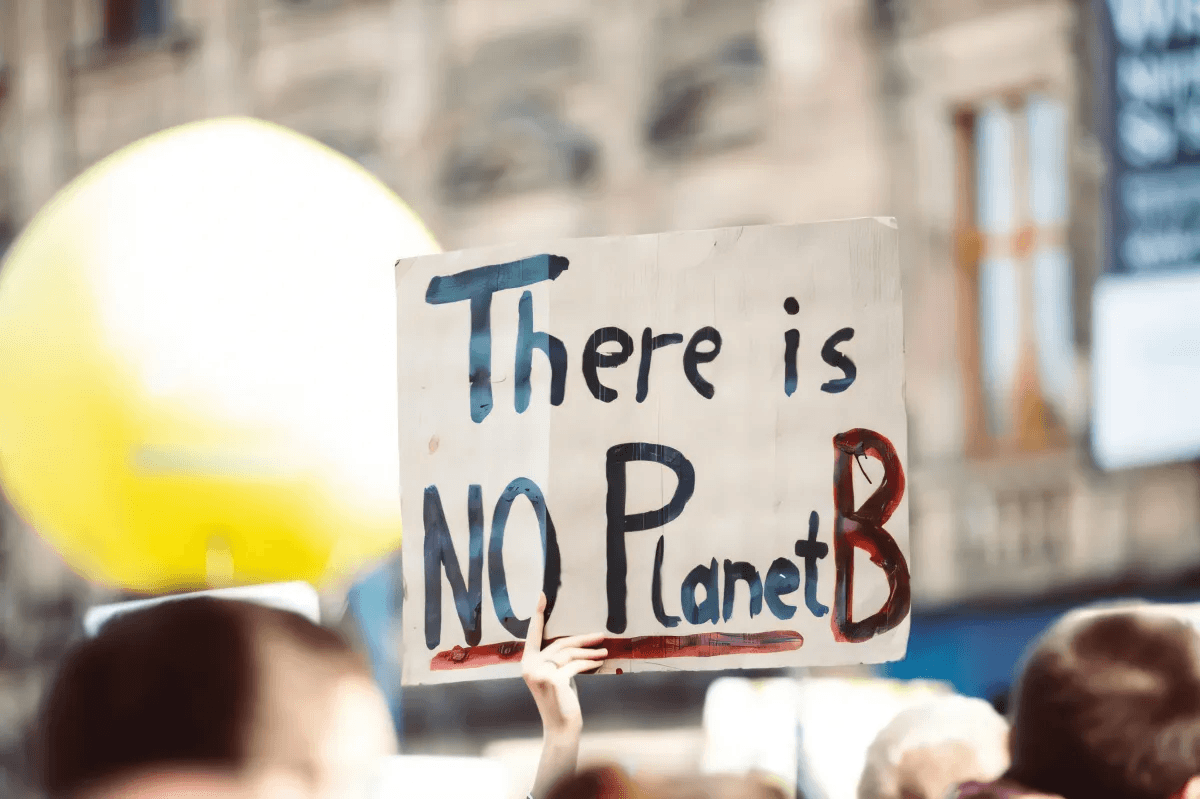Why The Next 4 Years Are Crucial For Climate Change

Climate change is a widely popular topic these days, but finding a universal consensus in terms of its legitimacy and a plan of action feels difficult.
Depending on where you are and who you talk to, expect to find a variety of different responses, anywhere from it being the biggest issue facing humanity to being a complete hoax.
Humanity faces a stark reality that we are out of time to take action against climate change. We already face irreversible damages to our planet and climate. If drastic action is not taken in the next 4 years, we face threats to the human race itself.
The following reasons to fight climate change are becoming more and more obvious.
1. Saving The Human Race
“Saving the planet” isn’t really the core message behind climate action activists. At least, it shouldn’t be. “Saving the human race” is a more accurate mission statement, although that could easily make conversations even more divisive.
The planet will be fine, regardless of what happens with climate change. It will simply become uninhabitable for humans if we continue on this path. Many people have likely seen graphs and information regarding the many warming and cooling periods that the earth has experienced over its lifetime.
There have been those cyclical times, however, that information is often used to dismiss the severity of the current warming trends caused by anthropogenic (human) effects. Whether the earth got extremely hot or extremely cold - it bounced back and became balanced again.
What is nearly impossible for humans to comprehend, however, is that those periods happened over 10,000+ years, almost every time. Even with the earth being 4.5 billion years old, a timeframe like 10,000 years is so hard to fathom.
The issue here is that our current warming trend is accelerating faster than the warming trends over 10,000 years, and we have seen that climb happen in a hundred years or even just a few decades.
2. Lies and Misinformation from Corporations
A huge contributor to not only climate change itself, but the lack of urgency among the general public has come from big corporations and the oil industry. ExxonMobil, for example, knew about and was researching climate change in the 1970s.
Yet, they still continue to fund climate-denying groups, so the population gets information presented to them that “climate change isn’t real” or “it's just another cycle of warming”.
That is exactly what the oil companies want to happen, so they can continue drilling for fossil fuels and contribute massively to the carbon emissions that create greenhouse gasses and a warming effect on our planet.
They certainly did not stop there. Oil companies put the blame on the consumer as well. British Petroleum - or BP - released a “Carbon Footprint Calculator” in 2004. The intent of the calculator was so the average consumer could see how big their “footprint” was in terms of carbon emissions and the impact on the environment.
Should you carpool, cut single-use plastics from your life and recycle more? Sure, those are all great things for sustainability. However, I feel like this is a great time for a gentle reminder that BP directly spilled 210 MILLION GALLONS of crude oil into the Gulf of Mexico in 2010. Just some food for thought, next time a mega-corporation asks you how you can lower your carbon footprint.
If you have not yet spilled 4.9 Million Barrels of oil into the Gulf of Mexico, you are doing better than BP. You may also find a single long-haul flight cancels out an otherwise carbon-neutral lifestyle.
3. Political Disregard Historically
The United States, generally touted as a world leader, has fallen short of Climate Action expectation. Al Gore, the author of “An Inconvenient Truth” lost the 2000 Presidential Election to George Bush. One has to wonder how different things may look for the climate now 20 years later. The Gore administration was clearly privy to climate change and its dangers.
Instead, George W. Bush took office and certainly wasn’t remembered for his action to combat climate change. The Paris Climate Agreement was created in 2015 to reduce carbon emissions and keep the global temperature rise under 2.0 degrees Celsius. Some 200 countries have agreed to partake in the agreement and do their part to help our planet.
Donald Trump declared to leave the Paris Climate Agreement in 2017, and it became official that the USA withdrew from the agreement on November 4th, 2020, becoming the first country to pull out of the agreement. With a new administration on the way in January of 2021, it marks the beginning of a lot of potential improvements.
Many other countries, meanwhile, are charging ahead with aggressive climate change fighting policies and goals. New Zealand just announced a climate emergency and will attack its climate goals to be carbon neutral by 2025. This is a tremendous leap in the effort, as the bill passed by Jacinda in her first term was to be carbon emission neutral by 2050.
4. Irreversible Damage Has Already Been Done
What happens if these goals are not met? Well, here are a couple of examples of what you can expect in the 2020s over the next decade, regardless of what action gets taken.
If there are not massive commitments made within the next 4 years to fight directly against these effects, catastrophic results will be normalized in our everyday lives. It is already being seen across the globe.
With the threat of entire US cities like New York and Miami being underwater, there is no more time to wait for action. It is not a debate.
Opinions and Perspectives
This isn't just about our generation anymore. We're deciding the fate of all future generations.
The part about cities being underwater really hit home for me. I live in a coastal area.
I'm going to share this with people who still think climate change isn't urgent.
We need more articles like this that connect the dots between corporate actions and climate impact.
The contrast between New Zealand's approach and other countries is striking.
I wonder what historians will say about this period when they look back at how we handled the climate crisis.
The timeline for action feels impossibly short, but we have to try something.
It's interesting how the article frames this as a human survival issue rather than an environmental one.
The article could have addressed the economic opportunities in transitioning to green energy.
I'm encouraged by the younger generation's commitment to fighting climate change. They seem to get it.
We need to stop debating whether climate change is real and start focusing on solutions.
The fact that one long-haul flight can cancel out an otherwise carbon-neutral lifestyle really puts things in perspective.
Reading about ExxonMobil's deception makes my blood boil. How is this not criminal?
The article makes a compelling case for immediate action, but we need more specific solutions.
I'd like to know more about the specific policies New Zealand is implementing to reach carbon neutrality by 2025.
The mention of irreversible damage is sobering. We can't undo what's been done, only prevent it from getting worse.
I'm trying to reduce my carbon footprint, but it feels futile when big corporations continue business as usual.
The comparison between individual carbon footprints and corporate pollution is really telling.
We can't rely on governments alone. Businesses and individuals need to step up too.
The four-year timeline really puts pressure on current world leaders to act now.
I think the article should have mentioned the impact on wildlife and ecosystems too, not just humans.
It's frustrating that we knew about this decades ago and chose to ignore it for profit.
The transition to renewable energy needs to happen faster. We have the technology, we just lack the political will.
I'm curious about the specific changes we'll see in the 2020s that the article mentions are already locked in.
We need to stop treating this like a political issue and start seeing it as the scientific reality it is.
The article could have mentioned more about potential solutions instead of just focusing on the problems.
I've noticed more extreme weather in my area over the past few years. It's scary to think this is just the beginning.
The fact that these changes are happening faster than natural cycles is what really concerns me. We're in uncharted territory.
Anyone else feel overwhelmed by the scale of this problem? It seems impossible to tackle sometimes.
I appreciate how the article distinguishes between saving the planet and saving humanity. The Earth will survive, but will we?
It's not just about regulations though. We need innovation in renewable energy and sustainable technologies.
The corporations won't change unless we force them to. We need stronger regulations and accountability.
We really missed an opportunity with Al Gore in 2000. Imagine where we might be now if climate action had started back then.
I find it interesting that the article emphasizes saving humans rather than saving the planet. It's a powerful way to reframe the discussion.
What worries me most is the mention of New York and Miami potentially being underwater. That's not some far-off future anymore.
The comparison between natural warming cycles taking 10,000 years versus our current situation happening in decades really puts things in perspective.
I work in environmental science, and I can confirm these timelines are accurate. The next four years are absolutely crucial.
How can anyone still deny climate change when we're literally seeing its effects? The wildfires, floods, and extreme weather are right in front of us.
This article makes some good points, but I feel it's too alarmist. We need balanced discussion to find real solutions.
The fact that the US pulled out of the Paris Agreement was such a huge step backward. I'm glad we're finally getting back on track.
New Zealand's commitment to being carbon neutral by 2025 is impressive. Why can't other countries follow their lead?
I think we need to focus on practical solutions rather than pointing fingers at corporations. What can we actually do as individuals?
What shocked me most was learning that ExxonMobil knew about climate change in the 1970s. They've been deliberately misleading us for decades!
The part about BP's carbon footprint calculator is eye-opening. I can't believe they tried to shift blame to consumers while causing that massive oil spill.
Actually, if you read the article carefully, it addresses that exact point about warming cycles. The key difference is the unprecedented speed of current warming compared to historical patterns.
I disagree that it's as urgent as they're making it seem. The Earth has gone through warming cycles before, and we're just in another one.
The timeline presented here is absolutely terrifying. I never realized we had such a short window to make meaningful changes.
